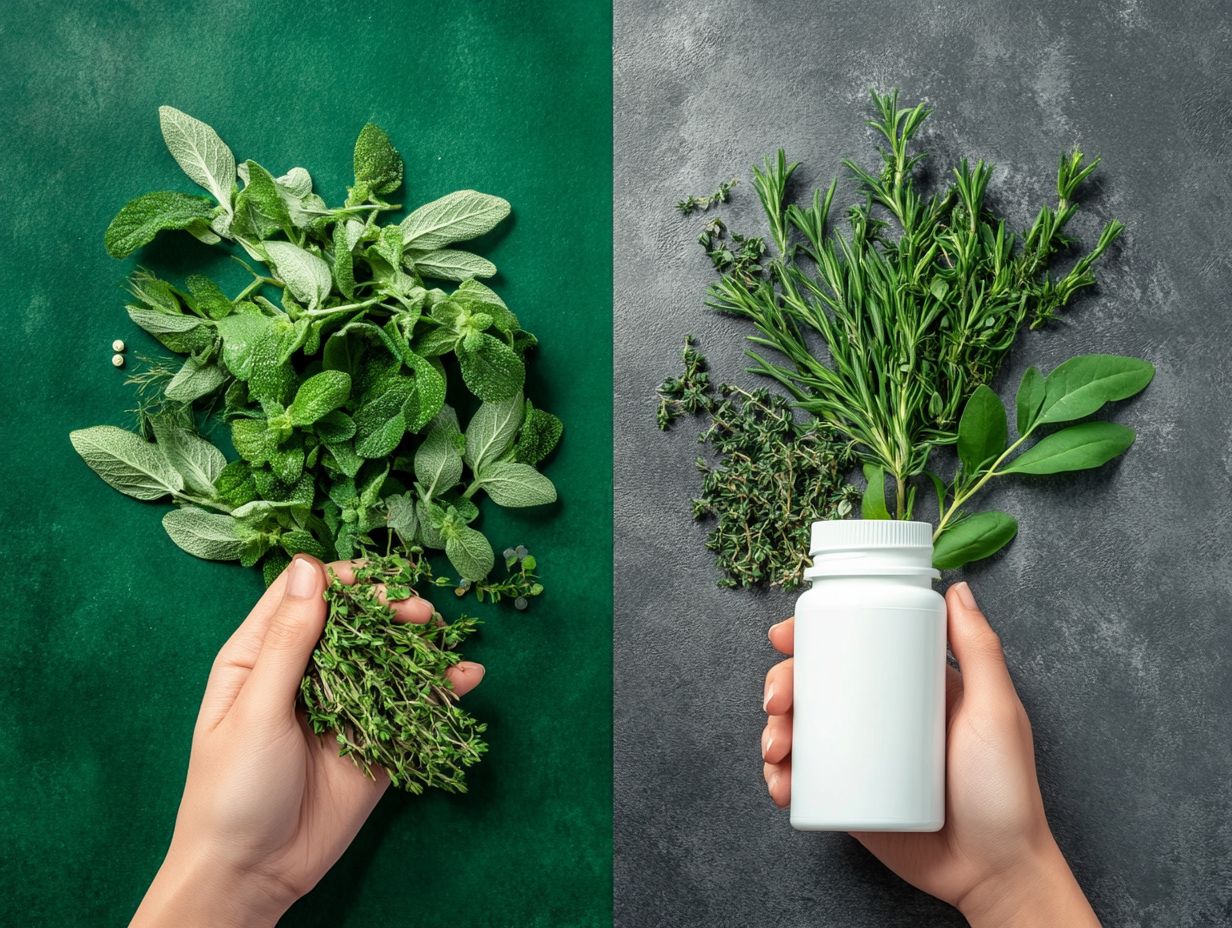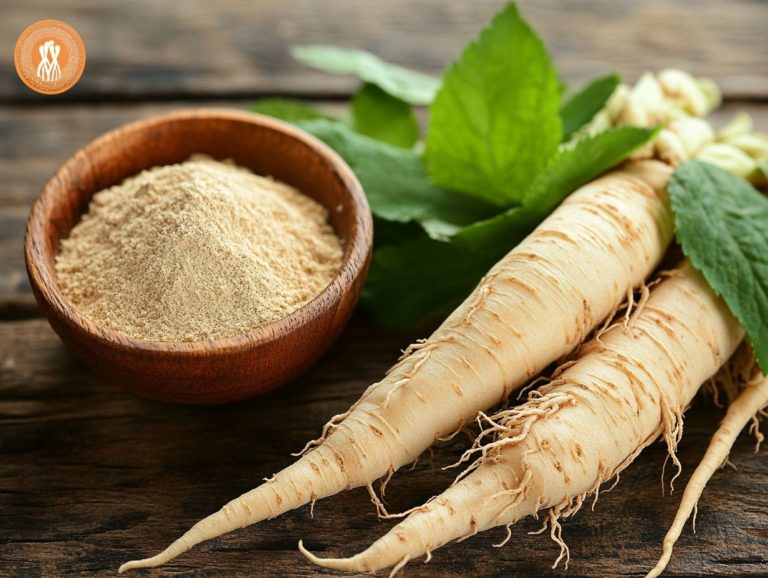Herbal Remedies: Myths vs. Facts
Explore herbal remedies, which have enriched health traditions worldwide for centuries. They offer a natural alternative for many common ailments!
However, misconceptions can obscure the genuine benefits and potential risks of herbal remedies. This article aims to clarify what herbal remedies truly are, dispel common myths, and delve into their evidence-based advantages.
It will also address possible side effects, provide tips for selecting the right remedies, and guide you on how to safely integrate them into your daily health routine. Dive in now to uncover the incredible benefits of herbal healing before it s too late!
Contents
Key Takeaways:

- Herbal remedies are plant-based treatments for various health issues.
- Research supports the effectiveness of many herbal remedies.
- Consult a healthcare professional to ensure safe use of herbal remedies.
Understanding Herbal Remedies
Understanding herbal remedies invites you into the rich world of herbal medicine, where an array of plant-based compounds showcase their remarkable healing properties and applications in health and wellness.
These remedies frequently act as complementary therapies to traditional medications commonly known as allopathic medications offering a whole-body approach to managing chronic conditions and everyday ailments.
Herbal practitioners underscore the value of natural, safe, and effective treatments, which makes herbal remedies an appealing option for those in search of alternative solutions to their health needs.
What are Herbal Remedies?
Herbal remedies are natural preparations crafted from potent herbs, celebrated for their healing properties in treating various health conditions.
These remedies come in a variety of forms, including herbal tinctures, soothing teas, and concentrated supplements, each designed to harness the unique benefits of specific plants.
For example, you might enjoy chamomile tea for its calming effects, or turn to echinacea tincture to give your immune system a boost. Then there’s ginger, often taken as a supplement to support digestion and reduce inflammation.
In today s wellness landscape, the importance of these natural solutions is gaining recognition as more individuals seek whole-body approaches to health that resonate with their lifestyle choices.
Common Myths about Herbal Remedies
You ll find that there are countless myths and misconceptions surrounding herbal remedies, which can create confusion about their efficacy, safety, and applications in health and wellness.
It s essential to navigate these misunderstandings with a discerning eye to fully appreciate the potential benefits and limitations of these natural solutions.
Dispelling Misconceptions
Dispelling misconceptions about herbal treatments is essential for your safety and well-considered choices in health and wellness.
Many individuals hold the belief that herbal remedies are entirely safe and devoid of side effects, but this couldn’t be further from the truth.
In reality, some herbal products can lead to adverse reactions or negatively interact with allopathic medications. Take St. John’s Wort, for instance commonly used for depression it has the potential to reduce the effectiveness of various prescription drugs, including birth control pills.
The notion that ‘natural’ equates to ‘harmless’ overlooks the intricate biochemistry at play with these plants.
This highlights the importance of consulting a qualified herbal practitioner who can guide you through these potential pitfalls. Understanding herbal safety not only gives you the power to make informed choices but also fosters a balanced approach to holistic health.
Benefits of Herbal Remedies

Herbal remedies present a wealth of health benefits, from bolstering your immune system to providing effective treatment options for chronic conditions. This makes them an invaluable addition to your dietary supplements and wellness routines.
Evidence-Based Uses and Benefits
Research studies reveal the impressive efficacy of herbal remedies, highlighting how these natural compounds can enhance your health and wellness.
Echinacea can reduce the risk of respiratory infections by up to 58%, according to a meta-analysis published in the Journal of Clinical Epidemiology. Turmeric, known for its powerful anti-inflammatory properties, significantly lowers inflammation markers, opening exciting possibilities for managing chronic conditions like arthritis.
A study published in the American Journal of Clinical Nutrition shows that individuals who regularly incorporate herbal supplements, such as ginger and garlic, enjoy diminished cardiovascular risks.
These findings highlight the benefits of incorporating herbal remedies into your health routine.
Risks and Side Effects of Herbal Remedies
Though many see herbal remedies as safe alternatives, it s crucial to consider the potential risks and side effects that can accompany their use, especially regarding interactions with allopathic medications.
Potential Risks and How to Avoid Them
Understanding the potential risks of herbal remedies is vital. This knowledge allows you to make informed choices and avoid adverse effects.
Before incorporating any herbal product into your health routine, it s wise to consult with a qualified herbal practitioner who can offer personalized guidance tailored to your specific health conditions.
Along with expert advice, conducting thorough research into each herb’s properties and possible drug interactions is essential. Some herbs might unintentionally impact the effectiveness of your prescribed medications.
Prioritize sourcing high-quality herbal preparations from reputable suppliers to ensure the purity and potency of the products you choose, further minimizing potential risks.
Being aware of your unique health profile enables you to identify any allergies or contraindications, creating a safer approach to using natural remedies.
Choosing the Right Herbal Remedies
When selecting herbal remedies, consider your health needs, the credibility of the herbal practitioners you consult, and the specific herbal solutions that fit your needs. Each decision you make in this process can significantly impact your overall well-being.
Factors to Consider when Selecting Herbal Remedies

When choosing herbal remedies, it’s crucial to consider several crucial factors, such as how these remedies may interact with allopathic medications, the expertise of herbal practitioners, and the effectiveness of the treatments themselves.
Many health claims are not regulated, leading to misconceptions. Review the scientific evidence to better understand each remedy s potential benefits and risks. It s essential to recognize how certain herbs might interact with your prescribed medications to avoid any adverse reactions.
To make informed decisions, follow these steps:
- Consult reliable sources
- Seek advice from qualified healthcare professionals
- Maintain open communication about any herbal products you wish to incorporate into your health regimen.
Incorporating Herbal Remedies into Your Health Routine
Incorporating herbal remedies can boost your well-being. This natural method promotes health through mindfulness and carefully chosen dietary supplements.
Tips for Safe and Effective Use
For the safe and effective use of herbal remedies, adhering to specific guidelines is essential. This ensures your safety while maximizing the health benefits these natural solutions can offer.
- Starting with lower doses allows you to gauge your body’s response, minimizing the risk of bad reactions.
- Always talk to your doctor before trying any herbal remedy!
- Educate yourself about potential side effects and interactions. Even natural substances can lead to unexpected issues.
- Maintain a mindful approach to assess how these remedies impact your overall well-being. This helps you make informed decisions to optimize your health outcomes.
Act now to ensure your safety!
Frequently Asked Questions
What are herbal remedies?
Herbal remedies are medicines made from plants and their extracts, used to treat various health conditions and ailments.
Are herbal remedies safe?

When used properly, herbal remedies can be safe and effective in treating certain health issues. Always talk to your doctor before using any herbal remedy, especially if you have existing health issues or are taking any medications.
Do herbal remedies have any side effects?
Just like any other medication, herbal remedies can have potential side effects. Make sure to research carefully and understand the potential risks associated with any herbal remedy before using it.
Are all herbal remedies natural and organic?
No, not all herbal remedies are natural and organic. Some may contain synthetic ingredients or additives, so it is important to read the label and understand the ingredients of any herbal remedy before using it.
Can herbal remedies cure all health problems?
No, herbal remedies are not a cure-all solution for all health problems. While they can provide relief for certain conditions, severe or chronic illnesses should always be treated under the guidance of a healthcare professional.
Are there any scientific studies to support the effectiveness of herbal remedies?
Yes, there have been numerous studies conducted on various herbal remedies, and some have shown promising results in treating certain health conditions. However, more research is needed to fully understand the effectiveness and safety of herbal remedies.
In conclusion, it’s vital to approach herbal remedies with care and knowledge, ensuring your health and safety at all times.





